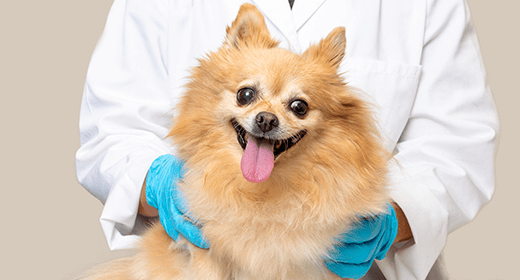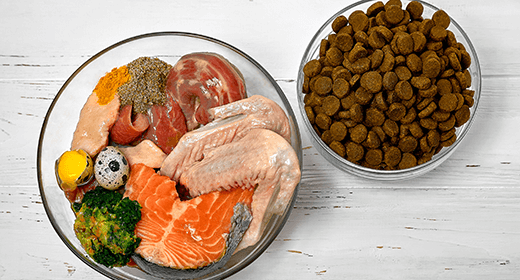

By now we all know obesity is unhealthy—for both people and pets. But do you know just how many health problems it can cause for your dog? Diabetes, bone and joint damage, decreased liver function, heart disease, increased blood pressure, and a heightened risk of cancer are just a few of the serious health issues caused by obesity. That’s a scary list. Protect your pooch by taking a proactive approach to keeping the pounds off. Here are some ways to do it.
Dogs do better with a controlled amount of food on a schedule. While some dogs can handle eating from an always-full and ever-present dog bowl, most will overeat if food is always available.
There are lots of dog foods out there, all offering something different. When it comes to keeping obesity in check, IAMS™ ProActive Health™ Adult Weight Control and IAMS Healthy Naturals™ Weight Management with Chicken formulas are great choices.
Your dog’s your pal, so it’s difficult not to share your tasty bacon or a bite of steak with him when he gives you those big, pleading eyes. But trust us—it’s worth it to resist. Feeding Fido “people food” ups his food and fat intake significantly. Plus, it creates bad habits: A dog that’s not fed from the table won’t learn to beg.
Obviously, a great way to keep your dog trim and fit is with some good exercise sessions. When you don’t have a lot of time, do short sessions of fetch or tug-of-war. Take it to the next level by jogging with your dog, tossing the Frisbee®, or starting agility training. And here’s a bonus: A dog that gets enough exercise is less likely to act out.
Of course you want to reward your dog when he’s good—but don’t forget that those treats can add up. Pay attention to the calorie and fat content of the treats you give. More importantly, take note of how many goodies you’re doling out—and how often.
Most of the time, a dog is overweight because he’s taking in more calories than he’s burning. But it is possible that there is a larger problem at work. If you’ve tried maintaining your dog’s diet and increasing exercise and still aren’t seeing results, talk to your veterinarian about a possible thyroid or other metabolic disorder.
Don’t get discouraged if you slip up every once in a while or don’t see results right away. Battling obesity is done day to day—it’s about forming good habits and being disciplined. By following the tips above and showing a little dedication, you’ll be on your way to having a healthier, happier dog.


Nutrients are divided into subcategories: protein, carbohydrates, fats, vitamins and minerals, and water. Regular brushing and professional cleaning can keep your dog’s teeth healthy and gleaming. Giving your pet appropriate toys to chew prevents fractures.
Common dog food protein sources include meat, poultry, fish, and some plant ingredients, such as corn gluten and soybean meal.
Protein is best known for supplying amino acids to build hair, skin, nails, muscles, tendons, ligaments, and cartilage. It also plays a main role in hormone production.
Dogs, best fed as carnivores, require essential amino acids that are not all found in the proper balance in single plant protein sources such as soybean meal.
Common carbohydrate sources are plants and grains. Carbohydrates, also categorized as starches (sugars) and fibers, provide energy and bulk, respectively.
Starches are made up of various types of sugar, such as glucose or fructose. Through digestion, dogs can easily convert sugar into usable energy.
Fiber may or may not be fermented or broken down into short-chain fatty acids by bacteria in a dog’s intestines. Highly fermentable fiber sources, such as vegetable gums, provide high amounts of short-chain fatty acids. Moderately fermentable fibers, such as beet pulp, provide short-chain fatty acids and bulk for moving waste. Slightly fermentable fibers, such as cellulose, provide mainly bulk for moving waste through the digestive tract and only a few short-chain fatty acids.
Water is the single most important nutrient for the body. Without it, the body cannot transport nutrients, digest nutrients for energy, regulate temperature, or eliminate water.
Fats are found in meats, poultry, fish, and plant oils. Fat, for all its bad press, fulfills many vital body functions. Animal cell membranes are made of fat. Fat also helps maintain body temperature, control inflammation, and more. Fat is the primary form of stored energy in the body, providing twice as much energy as carbohydrates or proteins.
Fats also have been shown to be important in blood clotting and managing inflammation.
Vitamins are responsible for aiding functions such as bone growth, blood clotting, energy production, and oxidant protection. Vitamins A, D, E, and K require fat for absorption into the body, while vitamins such as the B-complex vitamins and vitamin C need water to be absorbed into the body.
Minerals provide skeletal support and aid in nerve transmission and muscle contractions.